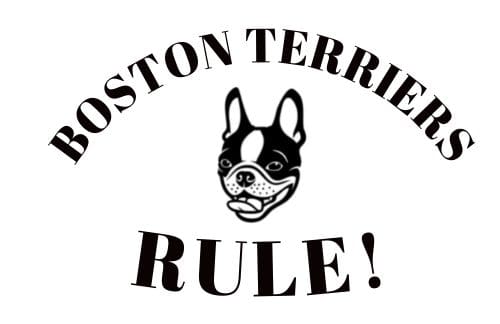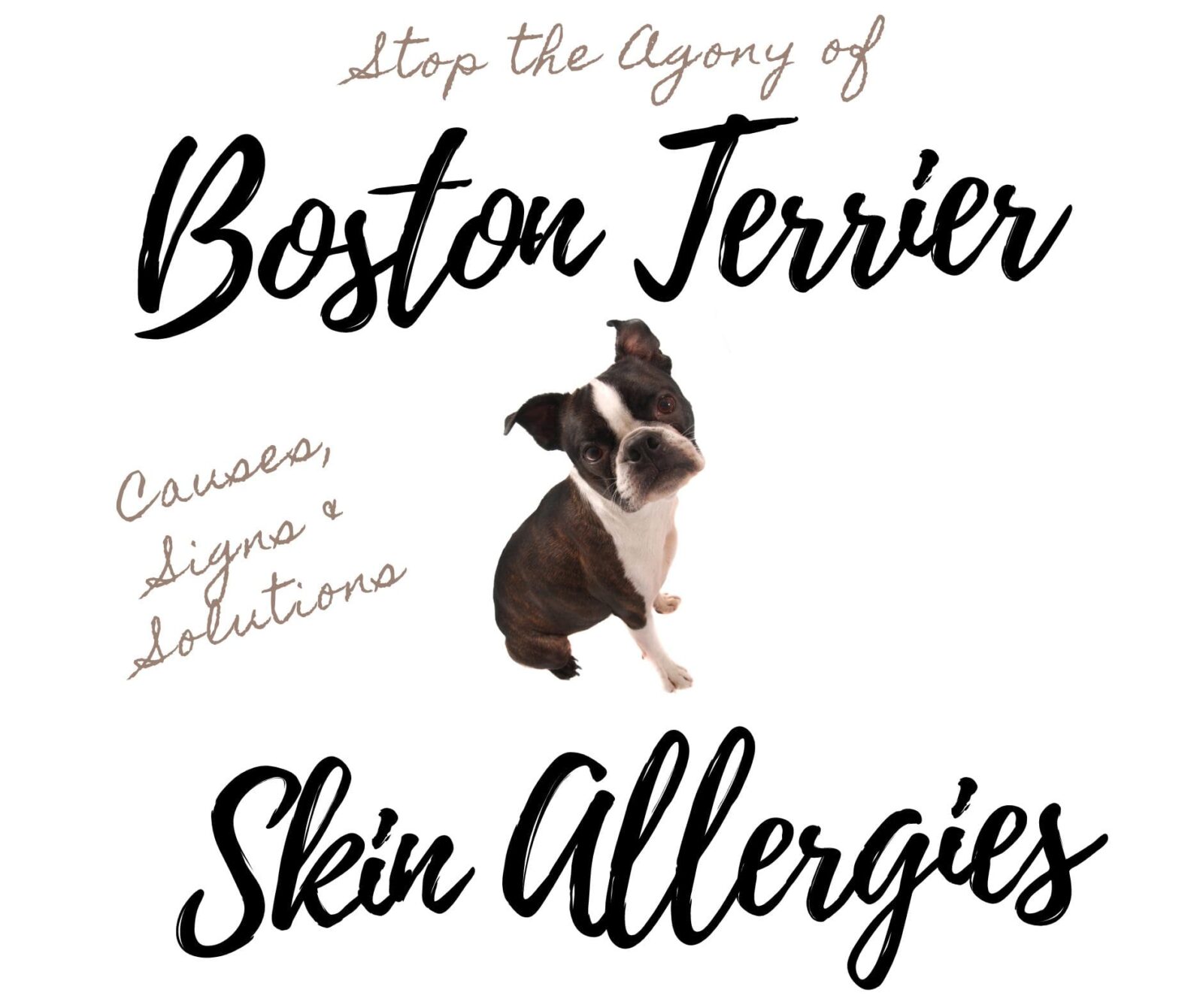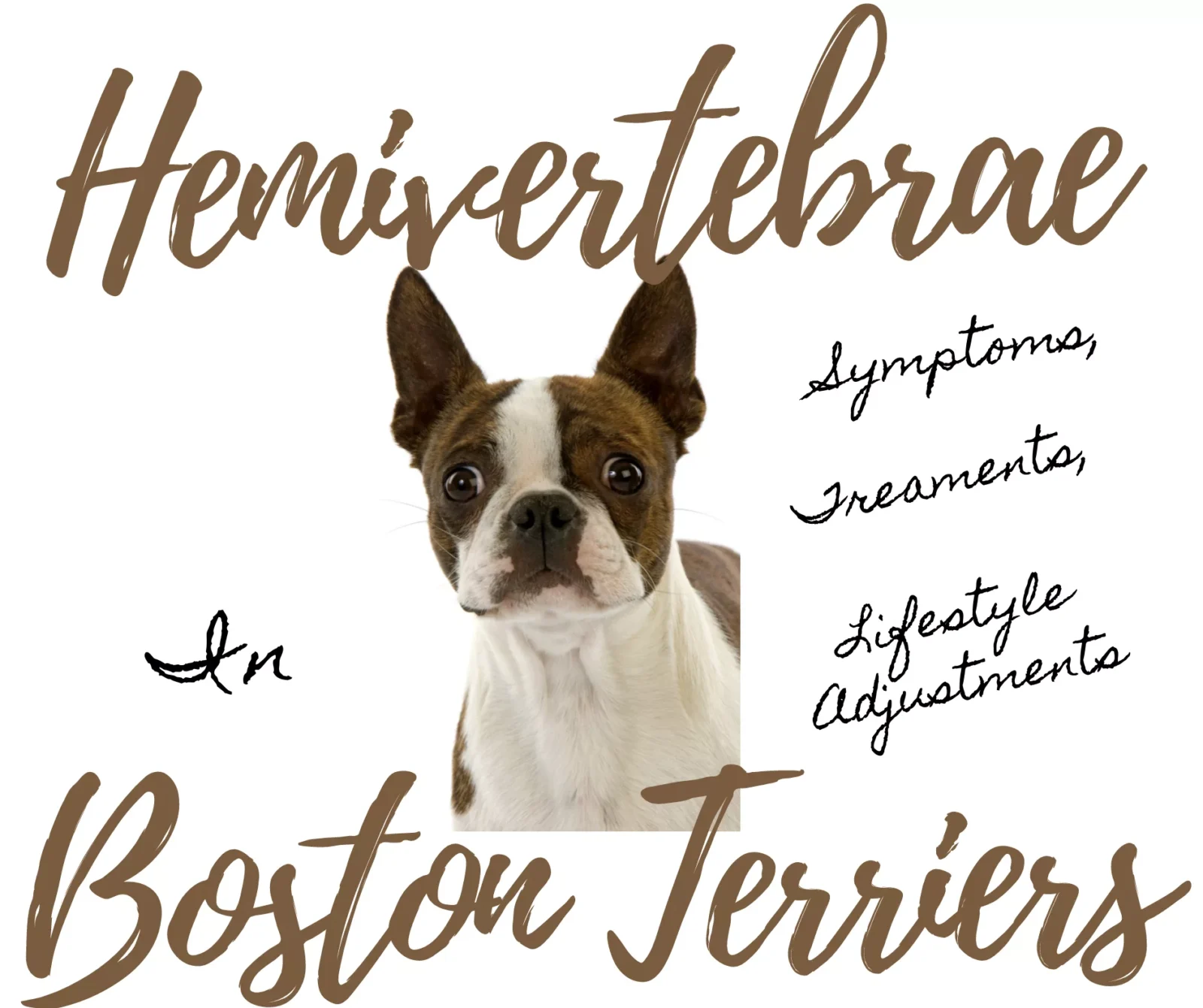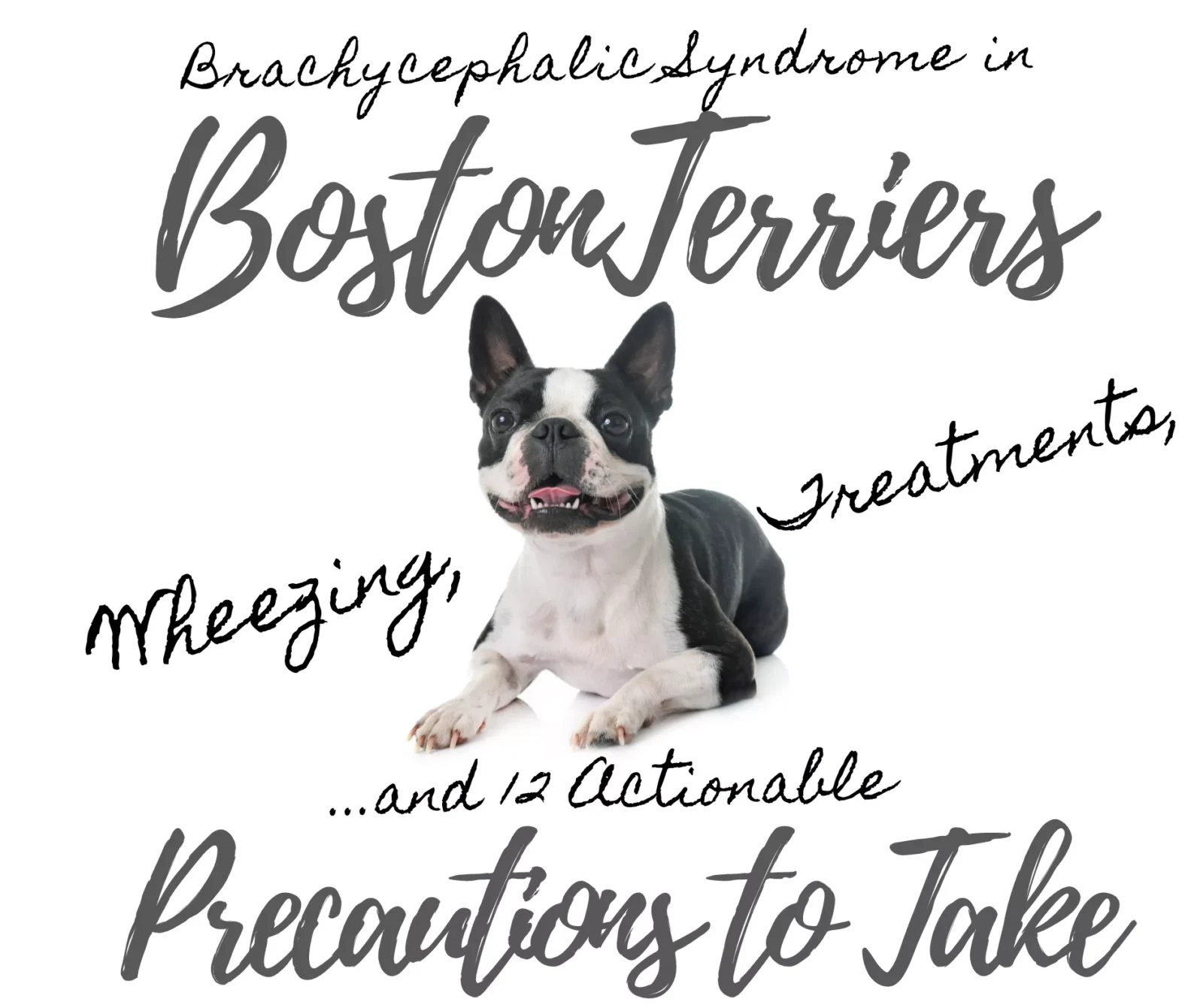Much like humans, Boston Terriers are susceptible to skin allergies that can bring about discomfort and unease. Gaining insights into the causes, symptoms, and solutions for Boston Terrier skin allergies is crucial to ensure their well-being and enhance their quality of life.
What Causes Boston Terrier Skin Allergies?
Skin allergies in Boston Terriers can be triggered by various factors, including:
Flea Allergy Dermatitis (FAD)
Fleas are a common cause of skin allergies in Boston Terriers. Flea saliva contains substances that can trigger an allergic reaction in sensitive Boston Terriers. Flea bites can cause intense itching, redness, and irritation, leading to scratching and potential skin infections. For a detailed article on Flea Allergy Dermatitis, click here.
Food Allergies
Certain proteins or ingredients in a Boston Terrier’s food can cause allergic reactions. Common food allergens for Boston Terriers include beef, chicken, dairy, wheat, soy, and corn. Boston Terriers with food allergies may experience itching, inflamed skin, gastrointestinal issues, and ear infections. For a detailed article on food allergies, click here.
Environmental Allergies (Atopy)
Environmental allergens such as pollen, mold, dust mites, and grass can trigger allergic reactions in Boston Terriers. These allergies often manifest as itching, redness, and skin inflammation. Environmental allergies can vary based on the region and season. For a detailed post on Environmental Allergies, click here.
Contact Allergies
Some Boston Terriers may be allergic to certain materials they come into contact with, such as cleaning products, grooming products, bedding, or fabrics. Contact allergies typically cause localized skin irritation at the point of contact.
Bacterial or Yeast Infections
Secondary bacterial or yeast infections can occur due to underlying skin issues, like allergies. These infections can worsen skin symptoms and require appropriate treatment.
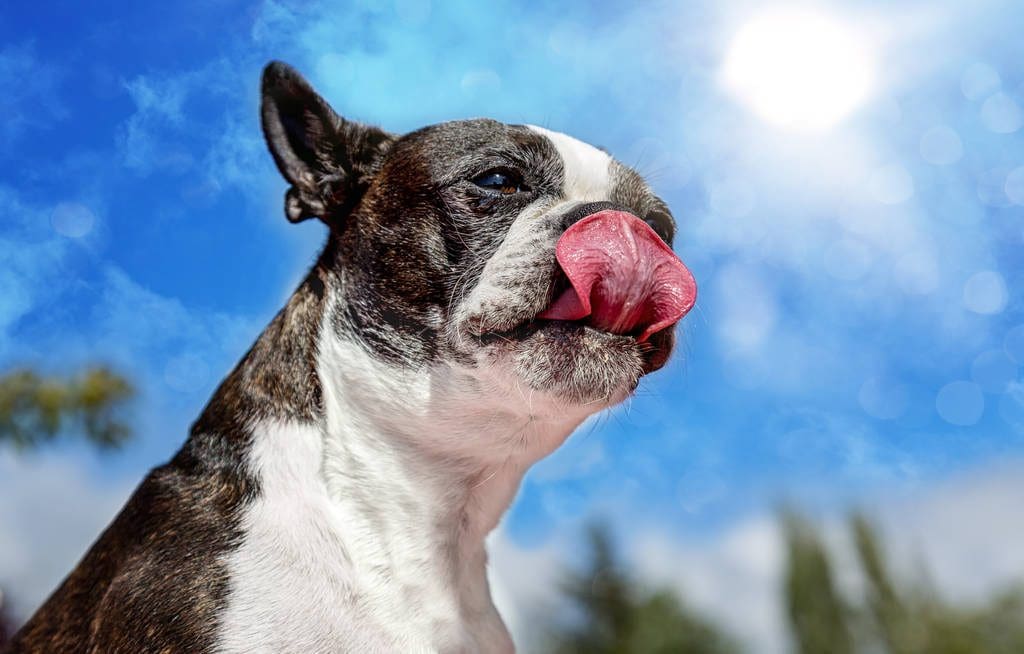
Signs of Boston Terrier Skin Allergies
Identifying the signs of skin allergies in Boston Terriers is crucial for early intervention and effective treatment. Common signs of Boston Terrier skin allergies include:
Itching and Scratching
Itching is a hallmark sign of Boston Terrier skin allergies. Boston Terriers may scratch, bite, lick, or chew their skin excessively, leading to redness, irritation, and potential hair loss in affected areas.
Red and Inflamed Skin
Allergic reactions often cause the skin to become red, swollen, and inflamed in Boston Terriers. The affected areas may appear sore and uncomfortable for the dog.
Rashes or Hives
Boston Terriers with allergies may develop rashes or hives on their skin. These can vary in size and severity and are typically accompanied by itching.
Ear Infections
Boston Terriers with allergies may also experience ear infections, which can cause discomfort, foul odor, and discharge from the ears.
Hair Loss and Hot Spots
Persistent scratching and biting due to allergies can lead to hair loss, and in severe cases, hot spots may develop. Hot spots are painful, moist, red patches of skin that can become infected if not treated promptly.

Solutions and Treatment for Boston Terrier Skin Allergies
Managing Boston Terrier skin allergies involves a combination of prevention, treatment, and proper care. Here are some effective remedies and treatments:
Flea Prevention and Control
Regular flea prevention is crucial in controlling flea allergy dermatitis in Boston Terriers. Use vet-recommended flea control products to keep fleas at bay and minimize allergic reactions.
Flea prevention and control are paramount in ensuring the well-being and health of Boston Terriers. These delightful and affectionate dogs are particularly susceptible to flea infestations, and it’s essential for their owners to adopt proactive measures to keep these pesky parasites at bay.
One of the significant issues associated with fleas in Boston Terriers is flea allergy dermatitis, a skin condition triggered by an allergic reaction to flea saliva. Even a single flea bite can set off this allergic reaction, leading to intense itching, discomfort, and potential secondary skin infections.
Regular and consistent flea prevention is key to managing and preventing flea allergy dermatitis in Boston Terriers. Pet owners should adhere to a routine recommended by their veterinarian to choose and apply appropriate flea control products. These products could include spot-on treatments, oral medications, flea collars, or topical solutions.
It’s vital to use only vet-recommended products, as they are not only safe for the dog but also effective in keeping fleas at bay. Over-the-counter products may not always be suitable or safe for Boston Terriers, and using the wrong product can exacerbate the flea problem or even harm the dog.
By investing in quality flea prevention products, pet owners can minimize the risk of flea infestations and the associated allergic reactions in their Boston Terriers. Regular application of these preventative measures helps break the flea life cycle, preventing larvae and pupae from maturing into biting adult fleas. Furthermore, maintaining a clean environment for the dog, including regular cleaning and vacuuming of living spaces, can aid in preventing flea infestations and reducing the overall flea population.
In addition to using vet-recommended flea prevention products and maintaining a clean living environment, pet owners should be vigilant in monitoring their Boston Terriers for any signs of fleas or flea allergy dermatitis.
Early detection allows for prompt intervention and treatment, minimizing the discomfort and potential health issues associated with flea infestations. Overall, a proactive and consistent approach to flea prevention and control is crucial for the optimal health and happiness of Boston Terriers and their owners.
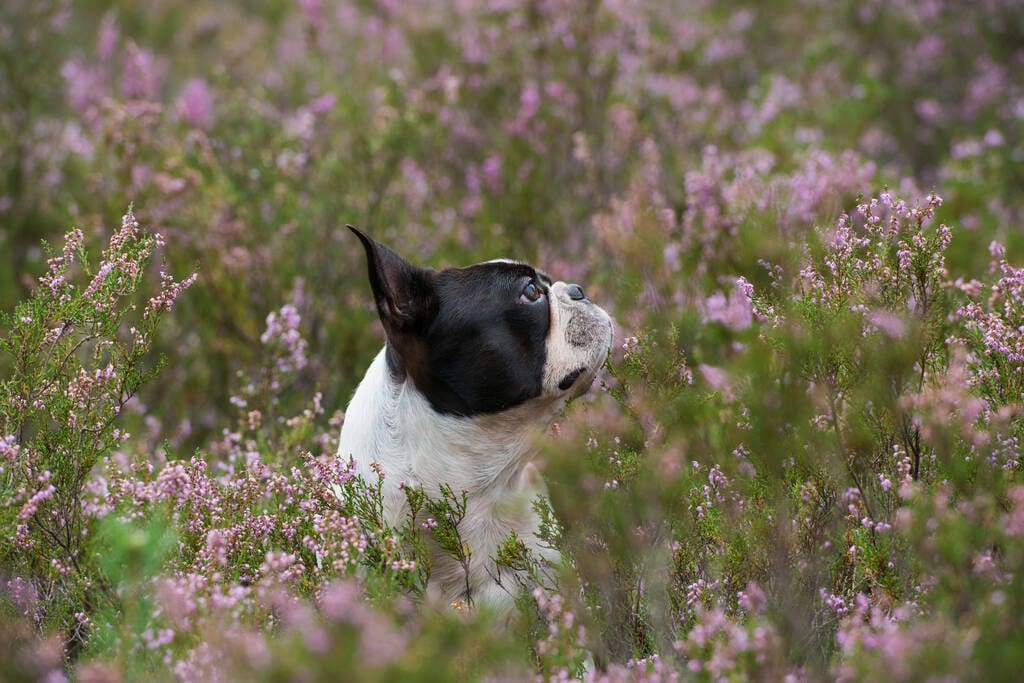
Allergen Avoidance
Identify and minimize exposure to known allergens for Boston Terriers. Keep your Boston Terrier away from grassy areas during high pollen seasons, use hypoallergenic bedding, and choose dog grooming products specifically formulated for sensitive skin.
Allergen avoidance is a crucial aspect of caring for Boston Terriers, especially those prone to allergies. These affectionate and playful dogs can suffer from various allergies, including pollen, dust mites, mold spores, and certain grooming products. Managing these allergens is essential to ensure the overall health and well-being of your Boston Terrier.
During high pollen seasons, it’s important to be proactive in keeping your Boston Terrier away from grassy areas and other environments where pollen levels are elevated. Pollen can trigger allergic reactions, leading to discomfort and health issues for your pup. Opt for walks and outdoor activities in areas with minimal pollen, and consider using dog-safe wipes to clean your Boston Terrier’s paws and coat after being outside to reduce pollen exposure.
Choosing hypoallergenic bedding for your Boston Terrier is another effective way to minimize allergens. Hypoallergenic materials help reduce the presence of dust mites and other potential allergens that can accumulate in traditional bedding. Wash the bedding regularly in hot water to maintain cleanliness and further reduce allergen exposure.
Moreover, selecting dog grooming products specifically formulated for sensitive skin is essential in allergen avoidance. Certain shampoos, conditioners, and other grooming products may contain harsh chemicals or fragrances that can irritate your Boston Terrier’s skin and exacerbate allergies. Opt for hypoallergenic, fragrance-free options that are gentle on the skin, minimizing the risk of allergic reactions.
Incorporating these allergen avoidance strategies into your Boston Terrier’s routine can greatly contribute to their comfort and health. Regular veterinary check-ups can also help monitor any signs of allergies and provide guidance on managing and preventing allergic reactions effectively. By being proactive and mindful of potential allergens, you can ensure a happier and healthier life for your beloved Boston Terrier.

Dietary Management
If your Boston Terrier has food allergies, work with your veterinarian to determine an appropriate hypoallergenic diet. Eliminate potential allergens from their diet and monitor their response to the new diet.
Dietary management for a Boston Terrier with food allergies is a crucial aspect of their overall health and well-being. Food allergies can manifest in various ways, including skin irritation, gastrointestinal issues, or even respiratory problems. Collaborating closely with a veterinarian is essential in identifying and addressing these allergies through a tailored diet.
The first step in dietary management is to consult with a veterinarian to confirm the presence of food allergies and identify specific allergens. Common food allergens for dogs, including Boston Terriers, may include proteins like beef, chicken, soy, wheat, and dairy. Once the allergens are pinpointed, an appropriate hypoallergenic diet can be recommended.
Hypoallergenic diets are formulated to exclude common allergenic ingredients, making them safe for dogs with food allergies. These diets typically contain novel protein sources or hydrolyzed proteins, which have been broken down into smaller components to minimize the likelihood of an allergic reaction. The carbohydrate source is usually from easily digestible options like rice or potatoes. By eliminating potential allergens and introducing these specialized diets, pet owners can help manage their Boston Terrier’s food allergies effectively.
Continuous monitoring of the Boston Terrier’s response to the new diet is critical. This involves observing any changes in their symptoms, such as reduced itching, improved coat condition, better bowel movements, or enhanced energy levels.
Regular check-ups with the veterinarian allow for adjustments to the diet if needed, ensuring that the Boston Terrier’s nutritional needs are met while effectively managing their food allergies. Additionally, maintaining a detailed dietary log and noting any allergic reactions or adverse effects will aid in fine-tuning the hypoallergenic diet to best suit the individual needs of the Boston Terrier.
Overall, careful dietary management is essential for enhancing the quality of life for Boston Terriers dealing with food allergies.
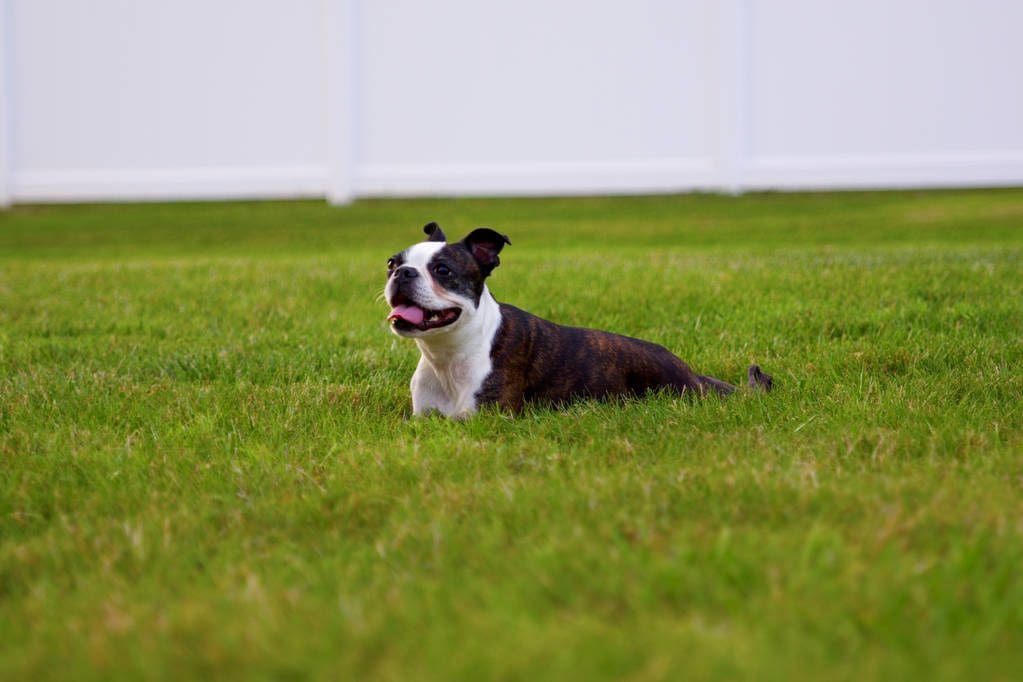
Medications
Antihistamines and corticosteroids can help alleviate itching and inflammation associated with allergies in Boston Terriers. However, these should be prescribed by a veterinarian based on the dog’s specific needs and condition.
Medications play a crucial role in managing allergies in Boston Terriers, addressing bothersome symptoms such as itching and inflammation. Antihistamines are commonly used to counteract the effects of histamine, a chemical released by the immune system in response to allergens.
These drugs block histamine receptors, effectively reducing itchiness, redness, and other allergic reactions. However, it’s essential to emphasize that not all antihistamines are suitable for dogs, and dosages must be carefully determined by a veterinarian based on the dog’s weight, age, and overall health.
Corticosteroids are another class of medications frequently prescribed to manage allergic reactions in Boston Terriers. They work by suppressing the immune response and reducing inflammation, providing relief from symptoms like swelling, itching, and discomfort.
These drugs can be particularly effective in severe allergic reactions or acute flare-ups. Nevertheless, corticosteroids should be used cautiously and strictly under veterinary guidance, as they may have potential side effects such as increased thirst, urination, and appetite, as well as potential long-term effects on the dog’s health.
It’s crucial to highlight that pet owners should never administer medications to their Boston Terriers without consulting a veterinarian first. A thorough examination and diagnosis by a qualified professional are necessary to determine the appropriate medication, dosage, and duration of treatment tailored to the dog’s specific needs and condition.
Furthermore, regular follow-ups and monitoring are essential to evaluate the medication’s efficacy and adjust the treatment plan if needed, ensuring the overall well-being and comfort of the Boston Terrier in managing their allergies.

Immunotherapy (Allergy Shots)
Immunotherapy involves administering small amounts of allergens to your Boston Terrier to desensitize their immune system over time. This can be an effective long-term treatment for environmental allergies.
Immunotherapy, commonly known as allergy shots, is a crucial form of treatment for managing environmental allergies in pets like Boston Terriers. Environmental allergies in dogs can manifest as skin irritation, itchiness, ear infections, and other discomforting symptoms due to their immune system’s hypersensitivity to specific allergens like pollen, dust mites, mold spores, or certain proteins present in insects. Allergy shots are designed to alleviate these symptoms and improve the overall quality of life for the affected Boston Terrier.
The process of immunotherapy involves injecting small amounts of the allergens that trigger allergic reactions into the Boston Terrier’s body in a controlled and gradually increasing manner. These injections are administered under the skin, usually starting with a very diluted form of the allergen.
Over time, the concentration of the allergen in the injections is increased to help the dog’s immune system build tolerance to the allergens. The aim is to desensitize the immune system so that it no longer overreacts to these substances, reducing the severity of allergic reactions.
Immunotherapy works on the principle of introducing allergens in a controlled and systematic way, stimulating the dog’s immune system to develop a tolerance or immunity to the substances that cause allergic reactions.
This treatment modality requires commitment and consistency, as it often involves a series of injections over several months, and sometimes even years, depending on the severity of the allergies and the response of the individual dog.
One of the significant advantages of immunotherapy is its potential for providing long-term relief and reducing the reliance on medications that may have side effects. By helping the immune system become more tolerant to specific allergens, the frequency and intensity of allergic reactions can be significantly reduced, enhancing the Boston Terrier’s overall well-being and comfort.
It’s essential to consult with a veterinarian to determine if immunotherapy is a suitable and effective treatment option for a Boston Terrier with environmental allergies, considering the dog’s health status, allergies, and overall medical history.

Topical Treatments
Shampoos, sprays, or creams with soothing ingredients like oatmeal or aloe vera can provide relief from itching and irritation for Boston Terriers. Always consult your veterinarian before using any topical treatments.
Topical treatments play a vital role in managing skin issues and providing relief for Boston Terriers and other dogs experiencing itching and irritation. These treatments typically come in the form of shampoos, sprays, or creams, containing soothing ingredients like oatmeal or aloe vera.
Oatmeal is known for its calming and anti-inflammatory properties, making it an excellent choice for alleviating itching and discomfort in the dog’s skin. Aloe vera, on the other hand, is recognized for its moisturizing and soothing effects on the skin, which can aid in reducing redness and irritation.
The use of these topical treatments should be approached with caution and under the guidance of a veterinarian. Consulting a veterinarian before introducing any new product is essential to ensure it is appropriate for the specific condition of the Boston Terrier and won’t cause further harm.
Veterinarians can provide insights into the right type of topical treatment based on the dog’s skin condition, allergies, and any other health concerns they may have. They can also guide on proper application, dosage, and frequency to achieve the best results and prevent any adverse reactions.
In addition to oatmeal and aloe vera, other soothing ingredients may be used in topical treatments for Boston Terriers, depending on their individual needs. These can include chamomile, tea tree oil, calendula, and hydrocortisone, which are known for their calming, anti-inflammatory, and antiseptic properties.
However, it’s crucial to emphasize that using any of these ingredients should be done cautiously and with professional advice to ensure they are safe and beneficial for the dog’s skin health.
Overall, topical treatments can be an effective and gentle approach to manage itching and irritation in Boston Terriers, aiding in their overall well-being and comfort. Veterinarians play a crucial role in guiding pet owners, ensuring the appropriate use of these treatments, and monitoring the dog’s progress to achieve the desired relief and improvement in their skin condition.

Bathing and Grooming
Regular bathing can help remove allergens from your Boston Terrier’s skin and coat. Use gentle, hypoallergenic shampoos and conditioners recommended by your vet.
Bathing and grooming are essential aspects of maintaining the health and well-being of your Boston Terrier. Regular bathing not only helps in keeping your Boston clean and fresh but also plays a significant role in managing potential allergies.
Allergens can accumulate on your Boston Terrier’s skin and coat, causing discomfort and health issues. Bathing is an effective way to remove these allergens, providing relief to your pet and creating a more comfortable living environment.
When it comes to bathing your Boston Terrier, it’s important to choose the right products. Opt for gentle and hypoallergenic shampoos and conditioners that have been recommended by your veterinarian.
These products are formulated to be mild on your dog’s skin, minimizing the risk of skin irritation or allergic reactions. Consulting your vet for product recommendations is crucial, as they can tailor suggestions based on your dog’s specific needs, ensuring a safe and effective grooming routine.
In addition to bathing, regular grooming is equally vital for a Boston Terrier’s overall health. Grooming involves brushing their coat, trimming nails, cleaning ears, and maintaining dental hygiene.
Brushing your Boston Terrier’s coat helps in removing loose fur, dirt, and debris, as well as stimulate the skin, promoting healthy hair growth and distributing natural oils that keep the coat shiny and healthy.
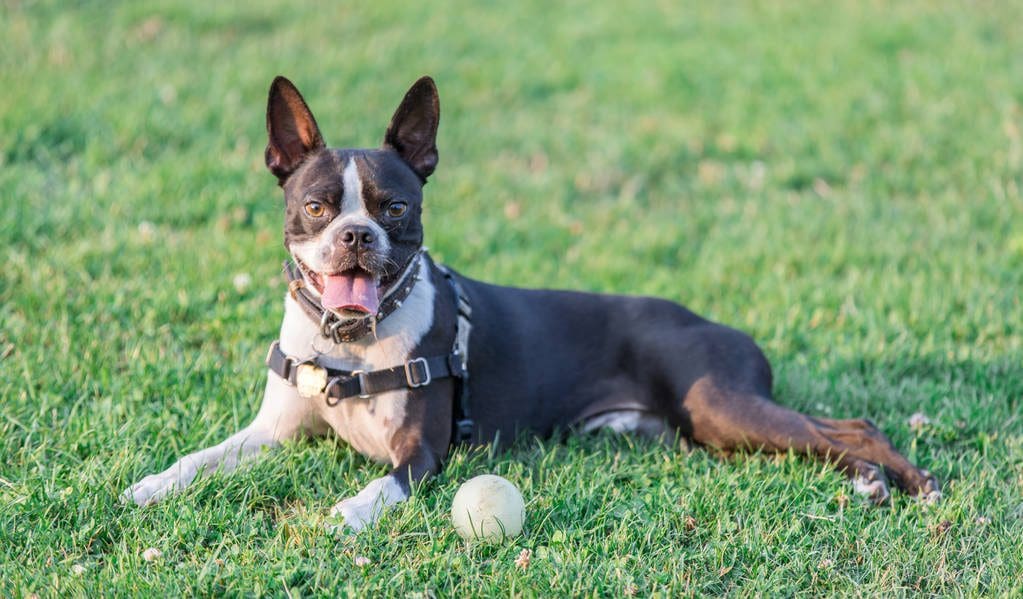
Supplements and Special Diets
Omega-3 fatty acids and specialized diets containing ingredients beneficial for the skin can help manage skin allergies and promote healthy skin in Boston Terriers.
Supplements and specialized diets play a crucial role in maintaining the health of Boston Terriers, particularly in managing skin allergies and promoting overall skin health. Among the various supplements, Omega-3 fatty acids stand out as a potent tool in enhancing skin health.
Omega-3 fatty acids, primarily found in fish oil, have anti-inflammatory properties that can help alleviate skin allergies and reduce skin irritation in Boston Terriers. These fatty acids are known to support the skin’s natural barrier function, keeping it moisturized and preventing excessive dryness or flakiness. By reducing inflammation, Omega-3 fatty acids can also contribute to minimizing redness and itching associated with skin allergies.
In addition to supplements, specialized diets that include ingredients known for their skin-beneficial properties can significantly aid in managing skin allergies and improving skin health. Ingredients such as lean proteins, complex carbohydrates, and a variety of fruits and vegetables can provide essential nutrients like vitamins, minerals, and antioxidants.
These nutrients play a vital role in maintaining the skin’s integrity and supporting its overall health. For instance, vitamins like A and E are known for their skin-healing and moisturizing properties. Incorporating such vitamins in the diet can help combat dry and flaky skin, a common issue in Boston Terriers.
Furthermore, tailored diets that exclude potential allergens or irritating ingredients can be crucial for managing skin allergies. Common allergens in dog food include wheat, soy, and certain meat proteins.
By eliminating these allergens and opting for hypoallergenic diets, Boston Terriers with sensitive skin can experience relief from allergic reactions. It’s essential to work closely with a veterinarian to determine the most suitable diet and supplements for a specific Boston Terrier, as individual needs may vary based on factors such as age, health condition, and severity of skin issues.
Overall, a combination of appropriate supplements and a carefully curated diet can significantly contribute to managing skin allergies and promoting optimal skin health in Boston Terriers, ensuring they lead a comfortable and happy life. Regular monitoring and adjustments to the diet based on the dog’s response are crucial to achieve the best outcomes.

Regular Veterinary Check-ups
Regular check-ups with your veterinarian are essential for monitoring your Boston Terrier’s skin condition, adjusting treatments, and ensuring overall health and well-being.
Regular veterinary check-ups are a fundamental aspect of responsible pet ownership, especially for Boston Terrier owners. These routine visits to the veterinarian offer a comprehensive evaluation of your Boston Terrier’s health, focusing on crucial aspects such as skin condition and overall well-being.
Through regular check-ups, veterinarians can monitor the skin for any signs of allergies, infections, or dermatological issues. They can also provide appropriate recommendations for maintaining healthy skin, which is vital for the overall comfort and happiness of your furry companion.
During these check-ups, veterinarians may also evaluate any ongoing treatments your Boston Terrier may be receiving and make adjustments as needed. This is particularly important if your dog has any chronic conditions or is on a specific treatment plan.
Regular check-ups allow the vet to assess the effectiveness of the treatment and make necessary modifications to optimize the therapeutic approach. This proactive approach ensures that your Boston Terrier receives the best care possible, leading to a higher quality of life.
In addition to addressing skin concerns and ongoing treatments, regular veterinary check-ups encompass a comprehensive assessment of your Boston Terrier’s overall health. This includes examining vital signs, weight management, dental health, heart and respiratory functions, joint health, and more.
Detecting potential health issues early on allows for timely interventions and better outcomes. Moreover, veterinarians can provide advice on preventive measures such as vaccinations, flea and tick control, and a balanced diet tailored to your Boston Terrier’s specific needs. Ultimately, regular veterinary check-ups are an essential component of responsible pet care, ensuring that your Boston Terrier leads a healthy, happy, and fulfilling life.

Conclusion
Understanding Boston Terrier skin allergies, their origins, signs, and appropriate solutions is vital for providing the best care for your beloved pet. If you suspect that your Boston Terrier is suffering from skin allergies, consult your veterinarian for a thorough diagnosis and a tailored treatment plan to keep your furry friend comfortable and happy. Prevention, early intervention, and consistent care are key to managing Boston Terrier skin allergies effectively.
If you are interested in other common genetic issues with Boston Terriers, click here.
Sources:
https://cuddla.com/blog/boston-terrier-allergies/

This post contains affiliate links. I earn from qualifying Amazon purchases.
